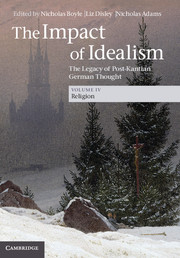Book contents
- Frontmatter
- Contents
- List of Contributors
- Acknowledgements
- List of Abbreviations
- Introduction: the impact of Idealism on religion
- 1 The impact of Idealism on Christology: from Hegel to Tillich
- 2 German Idealism's Trinitarian legacy: the nineteenth century
- 3 German Idealism's Trinitarian legacy: the twentieth century
- 4 Kierkegaard, Hegelianism and the theology of the paradox
- 5 Biblical hermeneutics: from Kant to Gadamer
- 6 Aesthetic Idealism and its relation to theological formation: reception and critique
- 7 The autonomy of theology and the impact of Idealism: from Hegel to radical orthodoxy
- 8 Faith and reason
- 9 Rabbinic Idealism and Kabbalistic realism: Jewish dimensions of Idealism and Idealist dimensions of Judaism
- 10 ‘In the arms of gods’: Schelling, Hegel and the problem of mythology
- 11 Dialectic and analogy: a theological legacy
- Bibliography
- Index
- References
2 - German Idealism's Trinitarian legacy: the nineteenth century
Published online by Cambridge University Press: 05 December 2013
- Frontmatter
- Contents
- List of Contributors
- Acknowledgements
- List of Abbreviations
- Introduction: the impact of Idealism on religion
- 1 The impact of Idealism on Christology: from Hegel to Tillich
- 2 German Idealism's Trinitarian legacy: the nineteenth century
- 3 German Idealism's Trinitarian legacy: the twentieth century
- 4 Kierkegaard, Hegelianism and the theology of the paradox
- 5 Biblical hermeneutics: from Kant to Gadamer
- 6 Aesthetic Idealism and its relation to theological formation: reception and critique
- 7 The autonomy of theology and the impact of Idealism: from Hegel to radical orthodoxy
- 8 Faith and reason
- 9 Rabbinic Idealism and Kabbalistic realism: Jewish dimensions of Idealism and Idealist dimensions of Judaism
- 10 ‘In the arms of gods’: Schelling, Hegel and the problem of mythology
- 11 Dialectic and analogy: a theological legacy
- Bibliography
- Index
- References
Summary
Fichte, Hegel and Schelling have had an enormous impact on the development of Trinitarian thought. Hegel and Schelling, in particular, have profoundly influenced Trinitarian thinking from their day until today. The root reason for this influence can be traced back to the way in which these three German Idealists embraced, from early on and each in his own way, what they understood to be the triadic structure of dynamically developing subjectivity.
J. G. Fichte: setting the stage
Fichte (1762–1814) was the earliest of the three to focus so intensely on what came to be this Idealist trademark; namely, the triadic structure of subjectivity. In his search to find a way to ground all experience and knowledge, he rejected Kant's notion of the thing-in-itself and argued at length that all we had to deal with was consciousness as such. In his ground-breaking work of 1794–5, Science of Knowledge, he laid out a basic principle followed by two further principles – all three were then to ground all science and thinking.
- Type
- Chapter
- Information
- The Impact of IdealismThe Legacy of Post-Kantian German Thought, pp. 48 - 68Publisher: Cambridge University PressPrint publication year: 2013



